The Blade Runner FAQ
Language Matters
(including Cityspeak, Blimp Ad and full Noodle Bar scene)
| What is BR? |
| News & Views |
| The FAQ |
| Encyclopedia |
| Quotes |
| People |
| Locations |
| Scripts |
| Analysis |
| Fan-tastic |
| BR Fun |
| BR Game |
| BR Magazine |
| BR Comic |
| Downloads |
| Collectibles |
| Related |
| Links |
| Site Info |
| Search Site |
BRmovie.com is the Home of Blade Runner - the current Blade Runner FAQ, news, resources, links, quotes, scripts and everything else Blade Runner.

![]()
Blade Runner
Buy this Mini Poster at AllPosters.com
|
Any
Comments? Please e-mail the Webmaster |
| Want the DVD? Or the BR Game? Don't know which books or music to get? Maybe you'd like a Deckard action figure? Make sure you check the BR Related section for all your BR choices. |
What are the languages used in BR?The languages spoken are English, Chinese, German, Japanese and "Cityspeak". What is "Cityspeak"?Cityspeak is a mixture of words and expressions from Spanish, French, Chinese, German, Hungarian and Japanese. The "conversation" between Deckard and Gaff in the beginning of BR is an example of this. Translation of the noodle bar scene dialogue (with comments):(Provided by and with introduction by Netrunner) The Noodle Bar scene:
Although transcripts and translations of this scene exist in hundreds of places on the Web, 99.9% of those are copies and are based on the original work of just a few people. We thank those few for their hard work, but note that they all contain definite mistakes and omissions, (including Future Noir!). We now take that work further, in order to get the best possible transcription and translation for everyone. It isn't perfect, (will it ever be), but it is the best version available. If you have anything you can add, we would love to hear from you. Sources:
Background to Cityspeak:
Olmos (with Scott) added more nationalities into Gaff's origins, plus the multilingual abilities. Olmos said, "The first idea of mine was to take some different real languages and mix them down, such as French, Chinese, German and Japanese. Then I went to the Berlitz School of Languages in Los Angeles, and translated and learned to pronounce all these little pieces of dialogue. It was something strange, but it was fitting well into Gaff." Mr Olmos has some Hungarian Jewish background, hence the incorporation of some Hungarian in Cityspeak. Problems in translating Cityspeak:
Note: In the following, I no longer label anything as "Cityspeak", but rather list just the actual languages that make up the non-English lines. - NOODLE BAR SCENE -
Blimp: A new life awaits you in the Off-world colonies. The chance to begin again in a golden land of opportunity and adventure. Sushi Master: {To a customer} Nan ni shimasho ka. [Japanese: "What'll it be?" Note: "Nan" is colloquial shortening of "Nani", so the translation given is less formal than the "What would you like to have?" it would be otherwise. Thanks to Gary for that distinction.]
<<OV only>> Deckard (voiceover): They don't advertise for killers in the newspaper. That was my profession. Ex-cop, ex-blade runner, ex-killer. Blimp: ... absolutely free. <<DC only>> Blimp: {Continues over some of the following dialogue} Use your new friend as a personal body servant or a tireless field hand - the custom tailored genetically engineered humanoid replicant designed especially for your needs. So come on America, lets put our team up there ... Sushi Master: {To Deckard} akimashita, akimashita! Irasshai, irasshai! [Japanese: "(The seat’s) free, (it’s) free!" Welcome, welcome!" Note: Akimashita is the past tense of "aku" - to become free". Although it sounds like "kimashita" this is in fact the past tense of "come", i.e. "came", and "Came, came!" is thus an unlikely translation. The Sushi Master gestures to the empty seat and effectively says, "The seat’s opened up! There’s a seat for you here!" - Thanks to Gary for the information.] {Deckard goes over to Sushi Bar.}
{Deckard sits where Sushi Master indicates.} Sushi Master: Nan ni shimasho ka. [Japanese: "What'll it be?"] Deckard: {Points} Give me four. Sushi Master: Futatsu de jubun desu yo. [Japanese: "Two is enough!"] Deckard: No. Four. Two, two, four. Sushi Master: Futatsu de jubun desu yo. [Japanese: "Two is enough!"] Deckard: {Resignedly} And noodles. Sushi Master: Wakatte kudasai yo. [Japanese: "Please understand!" (Actually implying (mildly) sarcastically, "Can't you understand?") He knows Deckard by name, so this is probably a familiar jibing between the two.]
Policeman: Hey, idi-wa. [Korean: "Hey, come here." {Thanks to Mark Taylor for confirmation.}]
{Deckard gestures to Sushi Master to translate. (The script had Deckard not understanding the original Japanese. The subsequent voiceover said of course he actually understood Cityspeak. So whether he really understands or not is pretty much your choice!)}
Deckard: You got the wrong guy, pal. Gaff: Lófaszt, nehogy már. Te vagy a Blade ... Blade Runner. [Hungarian: "Horsedick, no way! You are the Blade ... Blade Runner." (Thanks to Adam H. and eMU for confirming this Hungarian.)] Sushi Master: He say you 'Brade Runner'. Deckard: Tell him I'm eating. Gaff: Captain Bryant toka. Me ni omae yo. ["Japanese": "Captain Bryant wants to see your mug in front of his immediately!" (This is a very loose translation and is definitely Cityspeak rather than straight Japanese.) Note: The first part could actually be a strangulation of "Captain Burayanto ga" - grammatically meaning Captain Bryant is the subject of the sentence. "Me ni omae yo" may be a sort of pun. "Me ni mae" means to meet someone. "omae" is the very informal use of "you" - in Japanese, this is significant. "yo" - Exclamation - Japanese doesn't use the '!' punctuation. Thanks to Michael J. Simon for helping out with this line. However, note that this is an attempt at translation and as it stands is not standard Japanese. (Could this actually contain some other Oriental language?) Thanks to Gary for the additional info.]
Gaff: Hai! [Japanese: "Yes!"] {Deckard and Gaff leave in spinner.} -------------------------- (By Netrunner) What is the language used by the midgets that are ripping stuff off Deckard's car? What are they saying?They are speaking German. Here is the complete dialogue of that scene: [On the street... Police radio heard in background. Street vandals approach Deckard's car.]
Vandal: Ist jemand drinnen? [German: "Is somebody in there?"] Vandal: Ich kann nichts sehen. Hey, warte bis die Bullen weg sind! Hey, warte bis die Bullen weg -- [ German: "I can`t see anything. Hey, wait `til the pigs are gone! Hey, wait `til the pigs -- " Note that "bullen" actually translates to English "bulls", but this is the German slang equivalent of the Anglo/American "pigs" - that is, not just a colloquial "cops", but a rather more derogatory name for the police." Thanks to Anna K. for that explanation]
|

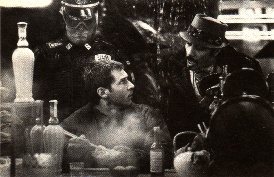 The
Noodle Bar is where we first meet Deckard, hear the (sometimes indistinct)
advertising blimp, listen to the Noodle Bar counterman speaking
Japanese and meet Gaff, with his unusual Cityspeak. This scene is
thus the source of many questions, particularly about what precisely
is being said.
The
Noodle Bar is where we first meet Deckard, hear the (sometimes indistinct)
advertising blimp, listen to the Noodle Bar counterman speaking
Japanese and meet Gaff, with his unusual Cityspeak. This scene is
thus the source of many questions, particularly about what precisely
is being said.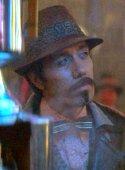 Edward
James Olmos (who played Gaff) was originally given a very small
character role to play. His input is what created the character
we know and he obviously inspired Scott et al, as the character
not only became considerably more interesting, but also more important
to the film. The character, even in the last script, was officious,
envious of Deckard and much less of a person. And he was to speak
straight Japanese, (intended to have English subtitles).
Edward
James Olmos (who played Gaff) was originally given a very small
character role to play. His input is what created the character
we know and he obviously inspired Scott et al, as the character
not only became considerably more interesting, but also more important
to the film. The character, even in the last script, was officious,
envious of Deckard and much less of a person. And he was to speak
straight Japanese, (intended to have English subtitles). {Rainy,
busy street scene. Deckard reading newspaper while waiting for a
spot to open up at the White Dragon Noodle Bar.}
{Rainy,
busy street scene. Deckard reading newspaper while waiting for a
spot to open up at the White Dragon Noodle Bar.}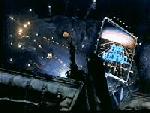 Blimp:
A new life awaits you in the Off-World Colonies. The chance to begin
again in a golden land of opportunity and adventure. Lets go to
the Colonies!
Blimp:
A new life awaits you in the Off-World Colonies. The chance to begin
again in a golden land of opportunity and adventure. Lets go to
the Colonies!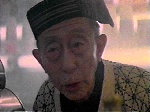 Sushi
Master: Sa dozo. [Japanese: "Come,
please." (sit down here)]
Sushi
Master: Sa dozo. [Japanese: "Come,
please." (sit down here)] <<OV
only>>
<<OV
only>>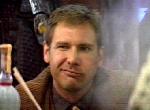 Gaff:
Monsieur, azonnal kövessen engem bitte. [French-Hungarian-German:
"Sir, follow me immediately please!" (Thanks to eMU for
translating the Hungarian part:- "azonnal" - means immediately;
"kövessen" - means follow imperative; "engem"
- means me. And of course "Monsieur" is French for Sir
and "bitte" is German for please.)]
Gaff:
Monsieur, azonnal kövessen engem bitte. [French-Hungarian-German:
"Sir, follow me immediately please!" (Thanks to eMU for
translating the Hungarian part:- "azonnal" - means immediately;
"kövessen" - means follow imperative; "engem"
- means me. And of course "Monsieur" is French for Sir
and "bitte" is German for please.)]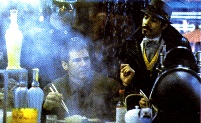 Sushi
Master: He say you under arrest, Mr. Deckard.
Sushi
Master: He say you under arrest, Mr. Deckard.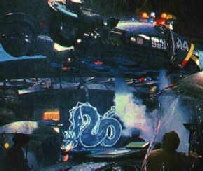 Deckard:
Bryant, huh?
Deckard:
Bryant, huh?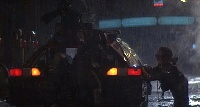 Vandal:
Jemand hat uns ein kleines Geschenk dagelassen. [German:
"Somebody left us a little present."]
Vandal:
Jemand hat uns ein kleines Geschenk dagelassen. [German:
"Somebody left us a little present."]